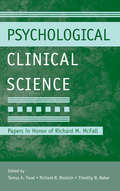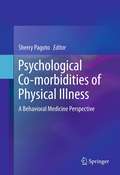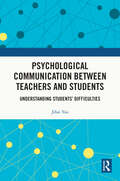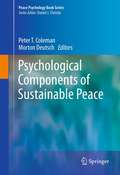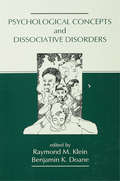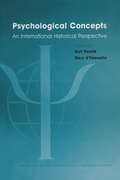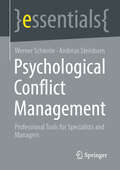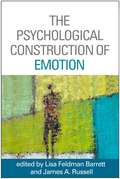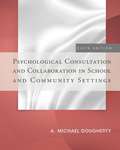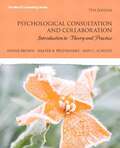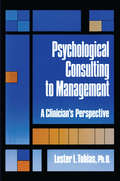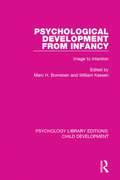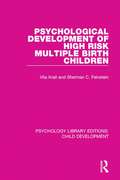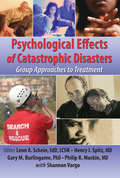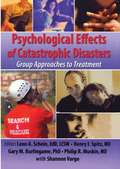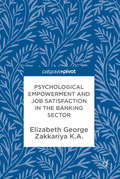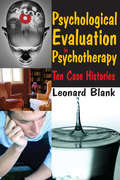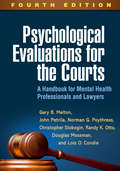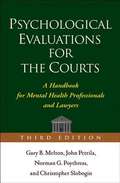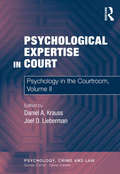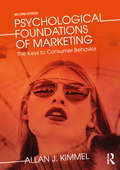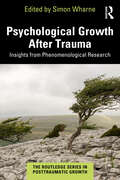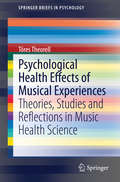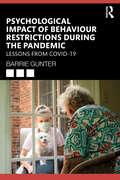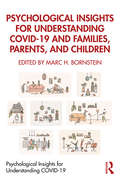- Table View
- List View
Psychological Clinical Science: Papers in Honor of Richard M. McFall (Modern Pioneers In Psychological Science: An Aps-psychology Press Ser.)
by Teresa A. Treat Richard R. Bootzin Timothy B. BakerPsychological Clinical Science offers readers insightful appraisals of the most current theory and research in psychopathology and evidence-based intervention. It honors Richard McFall of Indiana University, a visionary psychological clinical scientist widely recognized for his unwavering advocacy for a science of clinical psychology and for
Psychological Co-morbidities of Physical Illness
by Sherry PagotoEvidence for the efficacy of behavioral approaches to the treatment and management of physical illness is mounting, as is the evidence for behavioral interventions for psychological disorders. A pressing question that remains is how to effectively treat co-morbid physical and psychological illnesses. Diseases co-occur more often than not, and the co-occurrence of physical and psychological illnesses is associated with greater impairment and healthcare costs. Unfortunately, the treatment literature has traditionally been disease-specific, with fewer insights and discoveries regarding the underlying processes of co-morbid physical and psychological illnesses, and even fewer of approaches to treatment. Research on co-morbidities between physical and psychological illnesses has focused primarily on depression. Quite extensive literatures describe the negative impact of depression on type 2 diabetes, cardiovascular disease, cancer, obesity, pain, and other physical illnesses. More recently, higher rates of physical illness have been documented in individuals with bipolar disorder, anxiety disorders, schizophrenia, and impulse control disorders. Studies emanating from the National Comorbidity Survey-Replication (NCS-R), the only U.S. population-based database that includes diagnostic information on all DSM-IV psychological disorders, have revealed strong links between a number of physical and psychological illnesses. These data draw attention to the prevalence of physical and psychological co-morbidities at the population level, which has stimulated research on the biobehavioral mechanisms of those co-morbidities, with the goal of developing and improving treatment approaches. As this area of research grows, practical resources are needed for clinicians and researchers who encounter individuals with co-morbid physical and psychological illnesses in their work. This book is the first to provide a comprehensive overview of psychological co-morbidities of physical illness, biological and behavioral mechanisms of those co-morbidities, and implications for treatment. Each chapter focuses on a physical condition, such as obesity, type 2 diabetes, HIV infection, tobacco dependence, cardiovascular disease, cancer, asthma, pain, irritable bowel syndrome, autoimmune disorders, and obstetric/gynecological conditions. Chapters are structured to cover 1) the epidemiology of the most prevalent co-morbid psychological disorders within that physical condition (e.g., depression and other mood disorders, anxiety disorders, psychotic disorders, impulse control disorders, and eating disorders; 2) biobehavioral mechanisms of the co-morbidity; 3) a review of the behavioral treatment literature including evidence-based practice guidelines (where available); and 4) treatment considerations including issues of stepped care, evidence-based treatment decisions, treatment sequencing, treatment blending, treatment interactions, and contraindications. Content is guided by available research evidence and relevant theoretical models, and it is presented in such a way as to inform clinical practice, identify important gaps in the research literature, and provide directions for future research. The book serves as a tool for clinicians and researchers who work in the area of behavioral medicine in medical, academic, and/or training settings. Patients with psychological and medical co-morbidities may be encountered by clinicians working in either mental health or medical settings, where the presenting problem could be either the psychological disorder or the medical disorder. As such, assessment and treatment issues are discussed from both perspectives. For the clinician, the book reviews brief assessment tools, provides practical summaries of the treatment outcome literature and treatment considerations (e.g., treatment sequencing, contraindications), and includes treatment decision hierarchies that help the clinician incorporate each facet of evidence-based decisions (the evidence, patient characteristics, and their own expertise). For the researcher, the b...
Psychological Communication Between Teachers and Students: Understanding Students’ Difficulties
by Jihai YaoPsychological communication between teachers and students is the essence of formal education. This book focuses not only on analyzing problems from the perspective of teachers but also from the perspective of students and provides educators with ways to communicate effectively with their students.It is necessary for teachers to be concerned with cultivating and stimulating the internal motivation of students’ development. This book discusses the significance of psychological communication and effective communication between teachers and students, the psychological preconditions of communication between them and strategies that teachers can utilize to communicate more effectively with their students. In addition, the author provides a large number of cases, psychological tests and exercises to help teachers have a better understanding of themselves, their students and to find more effective working methods, while establishing a democratic, equal and harmonious interpersonal relationship between them.Communication between teachers and students is an essential and indispensable component during the process of teaching and learning. This book thus will be of interest to teachers, students, and researchers of educational psychology, education management and those who are interested in teachers' professional development in general.
Psychological Components of Sustainable Peace
by Peter T. Coleman Morton DeutschScholarship on the psychology of peace has been accumulating for decades. The approach employed has been predominantly centered on addressing and preventing conflict and violence and less on the conditions associated with promoting peace. Concerns around nuclear annihilation, enemy images, discrimination, denial of basic human needs, terrorism and torture have been the focal points of most research. The Psychological Components of a Sustainable Peace moves beyond a prevention-orientation to the study of the conditions for increasing the probabilities for sustainable, cooperative peace. Such a view combines preventative scholarship with a promotive-orientation to the study of peaceful situations and societies. The contributors to this volume examine the components of various psychological theories that contribute to the promotion of a harmonious, sustainable peace. Underlying this orientation is the belief that promoting the ideas and actions which can lead to a sustainable, harmonious peace will not only contribute to the prevention of war, but will also lead to more positive, constructive relations among people and nations and to a more sustainable planet. The Psychological Components of a Sustainable Peace is valuable and stimulating reading for researchers in peace psychology, political psychology, and conflict resolution as well as others who are interested in developing a sustainable, harmonious world.
Psychological Concepts and Dissociative Disorders
by Raymond M. Klein Benjamin K. DoaneThis book is based on a symposium that was inspired by the late Donald O. Hebb who, in his latter years while an Honorary Professor in the Department of Psychology at Dalhousie University, became very interested in the phenomenon of multiple personality and other dissociative states. Hebb was troubled by the lack of understanding of dissociative behavior and, through his discussions with basic science and clinical colleagues in psychology and psychiatry, he became convinced that the subject would be a figurative gold mine for psychological theory and experimentation. The purpose of the symposium was to bring together clinical and research scientists with an interest and expertise in dissociative phenomena such as multiple personality disorder, hysteria and hypnosis. This group would exchange ideas and findings, discuss theory, and lay the groundwork for an interdisciplinary research program into dissociative phenomena generally, and more specifically into multiple personality disorder and its principal precipitating factor -- physical and sexual abuse in children.
Psychological Concepts: An International Historical Perspective
by Kurt Pawlik and Géry d’YdewalleAmong the scientific advances over the last one hundred years, those in psychological science rank among the most prolific and revealing. The analyses of human intelligence and cognition, of human consciousness and self-awareness, of human memory and learning, and of human personality structure have opened up new avenues towards a deeper understanding of the human nature, the human mind, and its evolution. These new insights, whilst meeting high standards of research methodology, have also given rise to a conceptual grid which connects hitherto divergent lines of research in the human and behavioral sciences, leading up to present-day neuroscience.The Editors, both past presidents of the International Union of Psychological Science (IUPsyS), bring together a distinguished panel of international experts in the attempt to unravel, in a comparative cross-cultural and historical approach, changing contents and functions of psychological key concepts (such as intelligence, cognition, mind and the self). Their findings help to guide psychological theorizing, psychological experimentation and field research, and in so doing they apply behavioral science insights to the improvement of human affairs. Prepared under the aegis of the International Union of Psychological Science, the book exemplifies a concept-driven international history of psychological science.With its team of distinguished researchers from four continents, Psychological Concepts: An International Historical Perspective outlines the history of psychology in a truly innovative way.
Psychological Conflict Management: Professional Tools for Specialists and Managers (essentials)
by Werner Schienle Andreas SteinbornDo you want to handle conflicts (even) better? Do you want to know how to assert your interests without leaving a trail of broken relationships with colleagues, superiors, employees, or even in your social and friend circles? Here, you will find the answers. In this second edition of the essentials, which has already established itself as a standard work in its first edition, you will not only find a wealth of practical and easily applicable tools for everyday use, but you will also gain valuable insights into human thought and perception processes that promote conflict. Considering these insights will make your life much easier. Less petty conflicts, and more time and energy for your actual tasks.
Psychological Construction of Emotion
by James A. Russell Lisa Feldman BarrettThis volume presents cutting-edge theory and research on emotions as constructed events rather than fixed, essential entities. It provides a thorough introduction to the assumptions, hypotheses, and scientific methods that embody psychological constructionist approaches. Leading scholars examine the neurobiological, cognitive/perceptual, and social processes that give rise to the experiences Western cultures call sadness, anger, fear, and so on. The book explores such compelling questions as how the brain creates emotional experiences, whether the "ingredients" of emotions also give rise to other mental states, and how to define what is or is not an emotion. Introductory and concluding chapters by the editors identify key themes and controversies and compare psychological construction to other theories of emotion.
Psychological Consultation And Collaboration In School And Community Settings (Sixth Edition)
by A. Michael DoughertyWith Dougherty's PSYCHOLOGICAL CONSULTATION AND COLLABORATION IN SCHOOL AND COMMUNITY SETTINGS, 6th Edition, you will see how human service professionals help others work more effectively to fulfill their work-related or caretaking responsibilities to individuals, groups, organizations, and communities. <p><p> This practical book uses a proven generic model for application, surveys various approaches to consultation, examines the organizational context of consultation, and reviews the numerous ethical and professional challenges that today's consultants face. As you work through the book, you can develop or refine your own personal model of consultation. Case studies bring concepts to life and help you learn how to deliver services most effectively. <p> This edition includes new content aligned with CACREP and other standards, an increased focus on school-based consultation, new material on cultural diversity, advocacy, social justice, prevention, systems theory, and ecological variables as they affect consultation and collaboration in counseling and psychology, and much more to help you prepare for professional success. Available with InfoTrac Student Collections http://gocengage.com/infotrac.
Psychological Consultation and Collaboration: Introduction to Theory and Practice (The Merrill Counseling Series)
by Duane Brown Walter Pryzwansky Ann SchultePsychological Consultation and Collaboration: Introduction to Theory and Practiceprovides an overview of both the theory and practice of consultation and collaboration along with a summary of the empirical support, multicultural strengths, and limitations for each approach. Coverage includes mental health consultation, behavioral consultation, organizational development consultation, and the processes in consultation and collaboration–including the characteristics of the people who engage in them, evaluation of the outcomes of the two processes, and ethical guidelines for consultants and collaborators. Two chapters deal with the specifics of consulting with teachers and parents, with emphasis on multiple relationships among parents, schools, and communities. The 7th edition contains many cutting edge updates, including more information about empirically-based interventions; alternative views of the consulting relationship; school, family and community interventions; and recent research findings and updated policy statements. A new chapter examines Solution Focused Consultee Centered Consultation, an approach rooted in constructiveness theory that uses the consultee’s strengths to build interventions.
Psychological Consulting To Management: A Clinician's Perspective
by Lester L. TobiasFirst published in 1990. Routledge is an imprint of Taylor & Francis, an informa company.
Psychological Development From Infancy: Image to Intention (Psychology Library Editions: Child Development #2)
by Marc H. Bornstein William KessenOriginally published in 1979, this volume represented a unique attempt to connect the usually separated fields of infancy studies and studies of older children. In each chapter, eminent research workers attempt to cross the theoretical, empirical, and methodological barriers that had traditionally separated the study of preverbal infants from the study of verbal children and adults at the time. These completely new and original contributions traced the developmental links between birth and conversation within three major categories: perceptual, cognitive, and language development. Although the chapters range from reports of well-defined research areas to theoretical propositions, the aim throughout was to relate the events of the first year of life to the child’s later perceptual and cognitive activity. This book will still be of interest for all concerned with child development and related areas, in that it demonstrates the remarkable range of observations about infants brought under a single guiding set of questions about continuity, stability, and the sources of change during and after the first year of life.
Psychological Development of High Risk Multiple Birth Children (Psychology Library Editions: Child Development #4)
by Sherman C. Feinstein Vita KrallOriginally published in 1991, this monograph presents pioneering work on the growth and development of triplets, quadruplets and quintuplets. Twelve years were spent researching the effects of multiple caregiving, low birthweight and intra-uterine conditions on the personality development of multiple birth children. Child development specialists, psychologists and clinical psychologists will find this work applies not only to multiple birth children, but also to those born with low birthweights or other high-risk complications.
Psychological Effects of Catastrophic Disasters: Group Approaches to Treatment
by Philip R. Muskin Joseph Rose Henry I Spitz Leon Schein Gary BurlingameA thorough, user-friendly guide of basic knowledge and group interventions for psychological trauma from terrorist attacks and other catastrophic disastersThere is relatively little literature on the psychological trauma caused by catastrophic disasters, including terrorist attacks and the impending threats of terrorism. Psychological Effects of Catastrophic Disasters: Group Approaches to Treatment fills that gap by comprehensively discussing ways to minimize the psychological damage resulting from catastrophic disasters as well as the trauma developed from the threat of future terrorist attacks. The book provides thorough presentations of almost manualized group methods for the prevention and treatment of the acute and longer-term psychological effects for children, adolescents, and adults.Appropriate treatment immediately after a catastrophe can diminish harmful psychological effects, enhance an individual&’s quality of life, decrease psychosomatic illnesses and the exacerbation of chronic medical conditions, increase the effective utilization of medical facilities, and decrease medical expenses. In this book, internationally renowned authorities provide practical expert suggestions and helpful examples to illustrate the interventions and provide a quick reference for professionals facing the aftermath of prospective terrorist disasters and other catastrophic events. Psychological Effects of Catastrophic Disasters: Group Approaches to Treatment is divided into four sections. The first section provides an overview of the book; the second discusses the foundations and broad issues which potentially affect the outcome of group treatment; the third section presents group models which address the particular needs of children, adolescents, parents, emergency service personnel, and mental health practitioners; and the fourth part considers future directions of treatment. Designed to be used as a comprehensive single source for professionals working with victims of trauma caused by terrorism or catastrophic disaster, this book can be read and used in its entirety, or specific chapters detailing treatments can be chosen and used independently as needed. Extensive references allow opportunities for further research.Psychological Effects of Catastrophic Disasters: Group Approaches to Treatment presents unique first-person accounts of September 11th and examines: the neurobiological effects of a traumatic disaster the effective use of psychotropic medication the implications of living with ongoing terrorist threats a new framework for preparedness and response to disasters and trauma for children and families cultural, religious, and ethnic differences related to the prevention and treatment of psychological sequelae the diagnosis and treatment of traumatic grief retraumatization, distressing reminders, and their effects on post-traumatic adjustment the knowledge trauma therapists need to integrate small group principles the diagnosis and group treatment of acute and long-term effects with adults and children the use of spiritual principles after a terrorist disaster or catastrophic event nine types of groups appropriate for specific populationsPsychological Effects of Catastrophic Disasters: Group Approaches to Treatment is a timely, comprehensive reference for social workers, psychologists, psychiatrists, health professionals, mental health professionals, educators, and students.The royalties from this book shall be donated to organizations which provide direct services to those who continue to be affected by the events of September 11th, 2001 and Hurricane Katrina (August 29th, 2005).
Psychological Effects of Catastrophic Disasters: Group Approaches to Treatment
by Philip R. Muskin; Henry I. Spitz; Gary M. Burlingame; Leon A. ScheinThere is relatively little literature on the psychological trauma caused by catastrophic disasters, including terrorist attacks and the impending threats of terrorism. Psychological Effects of Catastrophic Disasters: Group Approaches to Treatment fills that gap by comprehensively discussing ways to minimize the psychological damage resulting from catastrophic disasters as well as the trauma developed from the threat of future terrorist attacks.
Psychological Empowerment and Job Satisfaction in the Banking Sector
by Elizabeth George Zakkariya K. A.This book explores how psychological empowerment can influence and enhance job satisfaction. The authors argue that in today’s working climate the wellbeing and involvement of employees is of utmost importance to any company’s overall success and that management techniques like empowerment are the most effective means of achieving this goal. Based on an empirical study examining job satisfaction amongst employees of several private sector, public sector and new generation banks in Kerala, India as well as extensive literature review, this book discusses the role psychological empowerment plays in enhancing job satisfaction both locally and internationally. It goes on to analyze four dimensions of psychological empowerment and the role of job satisfaction in the relationship between psychological empowerment and job related stress. This book will be of great interest to scholars in management and psychology and is essential reading for industrialists and managers wanting to apply empowerment strategies in their own workplace.
Psychological Evaluation in Psychotherapy: Ten Case Histories
by Leonard BlankWritten by a scholar who is a therapist and a psychodiagnostician, this book documents the direct relationship between patient response patterns to a battery of psychological tests, and their subsequent behavior in psychotherapy. Unlike other books in the field, which concentrate on psychodiagnostics or psychological report writing, Blank takes the reader, session-by-session, through the therapeutic notes of ten patients who were in therapy. At each step of the way, patient behavior in therapy is shown alongside test response patterns.This book, first published in 1965, continues to provide a major contribution, both as a practical manual and as a reference book for clinical psychologists, psychiatrists, social workers, trainees and students. Anyone who is interested in using psychological evaluations to better understand the intricacies of the therapeutic process will fi nd the book an invaluable aid. So also will those who want to sharpen their diagnostic skills as part of theory construction.The author also provides a description and rationale of commonly employed psycho-diagnostic techniques, diagnostic overviews for each of the ten patients emphasizing the dynamics of differing diagnostic patterns and their prognostic implications, complete test data and process therapy notes for each of the ten patients, and an analysis of the complex interplay of personality resources of the patient, the personality of the therapist and the fortuitous circumstances that enter into every therapeutic situation.
Psychological Evaluations for the Courts, Fourth Edition: A Handbook for Mental Health Professionals and Lawyers
by John Petrila Randy K. Otto Gary B. Melton Norman G. Poythress Christopher Slobogin Douglas Mossman Lois O. CondieTens of thousands of readers have relied on this leading text and practitioner reference--now revised and updated--to understand the issues the legal system most commonly asks mental health professionals to address. Highly readable, the volume demystifies the forensic psychological assessment process and provides guidelines for participating effectively and ethically in legal proceedings. Presented are clinical and legal concepts and evidence-based assessment procedures pertaining to criminal and civil competencies, the insanity defense and related doctrines, sentencing, civil commitment, personal injury claims, antidiscrimination laws, child custody, juvenile justice, and other justice-related areas. Case examples, exercises, and a glossary facilitate learning; 19 sample reports illustrate how to conduct and write up thorough, legally admissible evaluations. New to This Edition *Extensively revised to reflect important legal, empirical, and clinical developments. *Increased attention to medical and neuroscientific research. *New protocols relevant to competence, risk assessment, child custody, and mental injury evaluations. *Updates on insanity, sentencing, civil commitment, the Americans with Disabilities Act, Social Security, juvenile and family law, and the admissibility of expert testimony. *Material on immigration law (including a sample report) and international law. *New and revised sample reports.
Psychological Evaluations for the Courts, Third Edition
by Gary Melton John PetrilaThis is the definitive reference and text for both mental health and legal professionals. The authors offer a uniquely comprehensive discussion of the legal and clinical contexts of forensic assessment, along with best-practice guidelines for participating effectively and ethically in a wide range of criminal and civil proceedings. Presented are findings, instruments, and procedures related to criminal and civil competencies, civil commitment, sentencing, personal injury claims, antidiscrimination laws, child custody, juvenile justice, and more.
Psychological Expertise in Court: Psychology in the Courtroom, Volume II (Psychology, Crime, And Law Ser.)
by Daniel A. KraussExpertise in Court: Perspectives on Testimony is the second of a two-volume set on the Psychology of the Courtroom. The authors, a renowned group of psychology and legal scholars, offer definitive coverage of the use of psychological expert testimony and evidence in a variety of legal contexts. They explore the controversies that surround it, from questions of its admissibility to its effects on eventual juror decisions. A wide range of topics are covered including system and estimator variables in eyewitness identification, expert testimony on psychological syndromes, the insanity defence and sexual harassment, how child sexual abuse is used by the courts, and recent research on false confessions. They also provide a comparative analysis exploring how different types of psychological expert testimony and evidence are used by different countries’ legal systems. All the chapters conclude by making specific recommendations for how psychological research and information could be better utilized by courts around the world.
Psychological Foundations of Marketing: The Keys to Consumer Behavior
by Allan J KimmelThis is the only textbook to provide an applied, critical introduction to the role of psychology in marketing, branding and consumer behavior. Ideally suited for both students and professionals, the new edition is a complete primer on how psychology informs and explains marketing strategies, and how consumers respond to them. The book provides comprehensive coverage of: Motivation: the human needs at the root of many consumer behaviors and marketing decisions. Perception: the nature of perceptual selection, attention, and organization and how they relate to the evolving marketing landscape. Decision making: how and under what circumstances it is possible to predict consumer choices, attitudes, and persuasion. Personality and lifestyle: how insight into consumer personality can be used to formulate marketing plans. Social behavior: the powerful role of social influence on consumption. Now featuring case studies throughout to highlight how psychological research can be applied in the marketplace, and insightful analysis of the role of digital media and new technologies, this award-winning textbook is required reading for anyone interested in this fascinating and evolving subject.
Psychological Growth After Trauma: Insights from Phenomenological Research (The Routledge Series in Posttraumatic Growth)
by Edited by Simon WharnePsychological Growth After Trauma is a guide to moving away from assumptions about trauma as a simple form of ‘psychological damage.’ Each chapter promotes an understanding of difficult experiences as learning opportunities that help us attune to the reality of existence and become more at ease with the truths that trigger our anxieties.The book holds close to a phenomenological stance in which understanding emerges through experience and reflection. This is not a book that argues for a model that practitioners would be required to adopt and impose on their clients. Instead, Psychological Growth After Trauma brings insights and explorations together, allowing the reader to build their own framework for understanding.
Psychological Health Effects of Musical Experiences
by Töres TheorellThis book is about links between music and health. It focuses on music and public health, and, in particular, the potentially positive and negative effects of listening to and making music on the health of the general population. The book starts out by discussing the protection music offers against adverse effects of stress. It then discusses social aspects of music production and listening and examines religious music within the framework of social functioning. It offers insight into the physiological and psychological effects of music listening, the biological effects of singing, and the use of music in therapeutic situations and the rearing of children. The book concludes by discussing the significance of music for musicians and their health. Although it may seem that music has only good health effects, and therefore all professional musicians should be healthy, not all music effects are positive. The book describes situations in which music has negative health effects and makes clear that there is a pronounced difference between living with music for joy and to earn one´s living from making music. In the latter situation, performance anxiety may become a factor that affects health adversely.
Psychological Impact of Behaviour Restrictions During the Pandemic: Lessons from COVID-19
by Barrie GunterThis volume examines the undesirable or harmful cognitive, emotional and behavioural side-effects of COVID-19 and of the behavioural restrictions imposed by governments on their populations during the pandemic. Societal "lockdowns" and other intervening behavioural restrictions, built significantly around social isolation, used by governments to control the spread of COVID-19 disrupted the lives of most people. There were economic costs for many as workplaces closed down, as well as severe stresses on friendships and romantic relationships, an increase in instances of abuse and domestic violence, and concerns about people drinking too much alcohol or gambling too much as compensatory behaviours. Understanding which people were at risk, and in what ways, could teach important lessons for the future. Presenting a timely review of the most recent international research and evidence, author Barrie Gunter assesses the major collateral, psychological side-effects of the pandemic. Looking forward, Gunter also considers how new models might be developed that take into account not just the need to halt the spread of a new virus, but also minimise collateral damage which could be every bit as severe in both the short term and long term. Identifying and analysing the nature and severity of collateral side-effects of pandemic-related behaviour restrictions, this is essential reading for students and researchers in psychology, public health and medical sciences and policymakers assessing government strategies, responses and performance.
Psychological Insights for Understanding COVID-19 and Families, Parents, and Children (Psychological Insights for Understanding COVID-19)
by Marc H. BornsteinWith specially commissioned introductions from international experts, the Psychological Insights for Understanding COVID-19 series draws together previously published chapters on key themes in psychological science that engage with people’s unprecedented experience of the pandemic. This volume collects chapters that address prominent issues and challenges presented by the SARS-CoV-2 pandemic to families, parents, and children. A new introduction from Marc H. Bornstein reviews how disasters are known to impact families, parents, and children and explores traditional and novel responsibilities of parents and their effects on child growth and development. It examines parenting at this time, detailing consequences for home life and economies that the pandemic has triggered; considers child discipline and abuse during the pandemic; and makes recommendations that will support families in terms of multilevel interventions at family, community, and national and international levels. The selected chapters elucidate key themes including children’s worry, stress and parenting, positive parenting programs, barriers which constrain population-level impact of prevention programs, and the importance of culturally adapting evidence-based family intervention programs. Featuring theory and research on key topics germane to the global pandemic, the Psychological Insights for Understanding COVID-19 series offers thought-provoking reading for professionals, students, academics, policy makers, and parents concerned with the psychological consequences of COVID-19 for individuals, families, and society.
